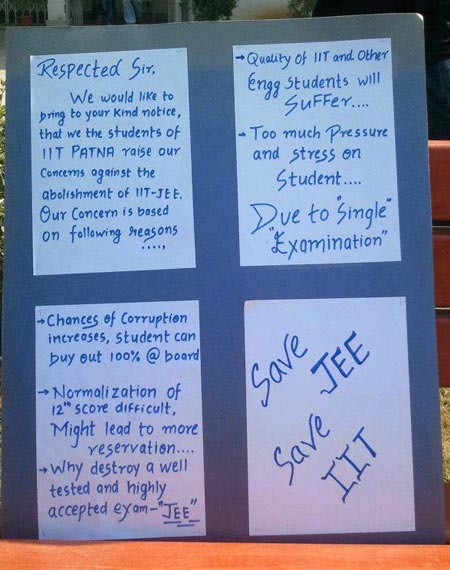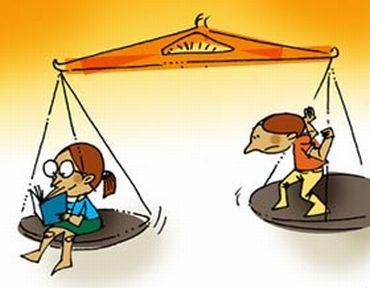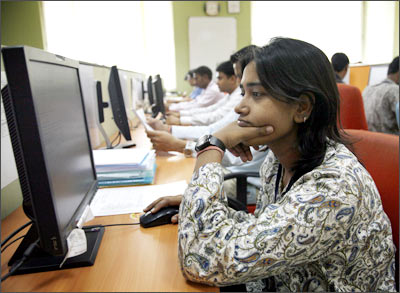 | « Back to article | Print this article |
Sibal's intent may be good, but 2013 is too early
Having a single entrance exam will not put an end to the coaching-class culture, nor help reduce stress, but will only aggravate it further, say academicians. While Sibal's plan may not be foolproof, having independent exams is not the solution too. So, then, is there a middle way out? We deliberate the situation.
When Kapil Sibal announced that he wants to introduce the one-nation-one-exam plan across the engineering colleges in the country, the minister of Human Resource Development had three things in mind -- to reduce the importance of coaching centres; to give more importance to Class 12 board examinations and to reduce the stress due to multiplicity of examinations.
The proposed new pattern aims to abolish the multiple engineering entrance exams namely IIT-Joint Entrance Exam (JEE), All India Engineering Entrance Exam (AIEEE) and state-level Common Entrance Tests (CET) in place of a new exam which will also attach weightage to performance in class 12 board exams.
Although these objectives sounds good on paper, unfortunately, the minister spoke too soon and has ended up receiving brickbats for all the right and wrong reasons.
We spoke to a few students, teachers and parents and realised that a lot of these problems arose due to ambiguity surrounding the details of new exam.
Puneet Mishra, a class 12 student of science from Mumbai is among the lakhs of students who are the receiving end of Sibal's new plan.
"Usually, students who appear for JEE or any engineering entrance exam prepare at least two years in advance. This year, we are not sure how to plan our studies. There is so much pressure for class 12 science students because we have to appear for board exams and also prepare for multiple entrance exams.
If the exam will be effective 2013 onwards, neither teachers nor coaching centres have been able to provide us with any details about the new exam, which is really worrisome," said the 18-year-old engineering aspirant from New English Junior College, Mumbai who is preparing for the IIT-Joint Entrance Exam and All India Engineering Entrance Exam.
Meanwhile, V Muralidharan, a parent of 17-year-old from Mumbai who enrolled for JEE coaching centre last year feels that 2013 is too early to test the new exam.
"My son enrolled for class 12 plus JEE and AIEEE coaching last year. We have paid Rs 80,000 already and the classes have also begun. Having one exam will only add to the stress of students. It will reduce any possibilities of having a second chance in case they don't crack the JEE."
Do you agree with the HRD Ministry's decision to having a common entrance exam will really help reduce the stress among students? Share your views with us! Post your comments on Rediff ZaraBol below!
Please click NEXT to continue reading
'Board exams don't test you for analytical skills'
One of the apprehensions that students, teachers and especially those who study at the IITs have with the new exam that is supposed to go into effect from 2013 is that it will take into account the board exam performance too.
Prince Kumar, co-founder of IITians.org, an organisation that aims to protect the interest of students from IIT says the inclusion of board examination scores as a criterion for admission is not acceptable.
"Each state runs its own board exam. Plus, we have CBSE and ISC exams to consider. Each board has its own way of evaluating exams. Unless we have a common board exam or a fool-proof normalisation process, it is unfair to include varying board exam scores as an important part of the eligibility criteria," says the third year student of textile engineering from IIT-Delhi.
Prof Sanjeev Sanghi, president, Indian Institute of Delhi Faculty Forum further explains how the 3-point agenda of the new exam fails in its very purpose and needs to be addressed differently.
"According to Sibal, if we follow the new exam, students will give less importance to coaching. I think the minister fails to understand that students go for private coaching because schools lack the necessary infrastructure. If you really want to improve school education, you should focus on providing better infrastructure, better teachers and not target entrance exams that encourage competency and talent in the country."
Academicians and students also feel that having a common entrance exam will only add to the stress of the students if not reduce it.
In fact, Praveen Tyagi, director of IITians Pace Education Pvt Ltd, a Mumbai-based private coaching institute run by IITians explained how the new plan will encourage cramming and impact test of competency and engineering aptitude.
"Board exams don't test you for analytical skills. JEE is one of the few exams that help differentiate students with the best of talent from the others. And given that there are lakhs of students appearing for the entrance exam, for a few thousand seats in the IITs, having a common entrance exam will only reduce their chances of getting into one," said Tyagi, who is an alumnus of IIT-Delhi.
Prof Ajit Kumar Chaturvedi of the Department of Electrical Engineering, IIT-Kanpur explained how it will affect the careers and future of lakhs of science and engineering aspirants.
"The board examination is a mere system to improve the literacy rate of our country and enable more students to qualify class 10 or 12. It cannot be used as a tool to determine eligibility to centres of excellence like the IITs. Besides, if you observe the board exam scores in most states this year, the performance has been above average, with students scoring an aggregate of 97 per cent and above in most states. This is not a good sign at all. All this has happened due to the education department's constant efforts to improve the pass percentage and giving undue advantage to students. By bringing a one-exam rule and giving importance to board exam scores, you will only aggravate their worries."
Prof Kumar says that the new plan will encourage students to pick up subjects that are high-scoring and instead avoid language subjects for fear of scoring lesser marks. "Students will choose subjects for their advantage not for their interest/aptitude, which is not a healthy trend," he pointed.
Meanwhile, Prince Kumar suggests that the government must conduct proper research before coming up with a final proposal.
"The government has not done proper research before coming up with a proposal. The reports produced by the HRD ministry have irregular statistics and hypothetical data from various boards which has several discrepancies. If the government wants one entrance exam, why not have a single board exam across the country too? We all know that's not possible because each state has its own way of evaluating students and hence uniformity cannot be maintained," expressed the IITian.
Illustration: Dominic Xavier
Why the hurry? Why target the 2013 batch?
So, where does that leave the IITs? If they don't agree to go with the new plan, will they conduct their own examinations?
Even as early reports suggested that IIT-Kanpur may conduct its own examination, Prof Ajit Kumar Chaturvedi from IIT-Kanpur says it is too early to make an announcement.
"We don't accept the current proposal, Period. The senate of all IITs have also agreed to this decision unanimously. We have not decided whether to have a common examination or a separate examination as it depends on the final stance of the government.
Our only question is why the hurry? Why target the 2013 batch?
We are hoping the government retracts its current proposal, and instead give us time and deliberate the proposal to arrive at a better decision. Any new rule should not affect the 2012 or the 2013 batch of students," Prof Chaturvedi says.
When there is a consensus on the fact that the JEE is definitely one of the most rigorous and competent exams held in the country, how can the education department possibly try and replace the multiple entrance exams like AIEEE, CET and private engineering exams with a common exam and put the careers of lakhs of engineering aspirants at stake?
The minister may have a good intent while saying that he wants to reduce the stress off students and encourage importance attached to board examinations, but inclusion of board examination scores cannot be justified unless the department is able to devise an appropriate normalisation process and promises to attach higher importance to aptitude over academic performance.
In 2012, five lakh twenty thousand students appeared for the Indian Institutes of Technology organised JEE for 10,000 engineering seats. Students who did not make it to the IITs could still try their luck by appearing for the AIEEE or state-level Common Entrance Tests.
By having a single entrance exam, the education department may be risking the future of more than five lakh engineering aspirants who may have to prepare and appear for multiple entrance exams by the remaining engineering colleges, who will be left with no choice but to conduct their own entrance examination. This by no means will reduce the pressure nor help bring down the impact of coaching institutes but only aggravate it further.
We may not come up with an immediate solution, but we can definitely try and deliberate the proposal and come up with a more agreeable solution that will impress the faculty, students and the country.
In Chaturvedi's words, "Any competitive entrance exam should also test aptitude of students and not their academic performance. And any new plan should be implemented only two years after its announcement so that students have enough time to prepare and plan their career accordingly."


